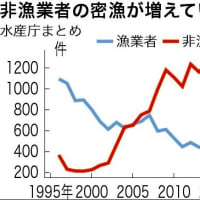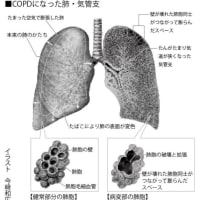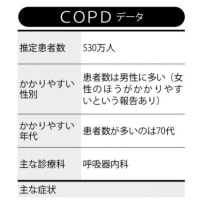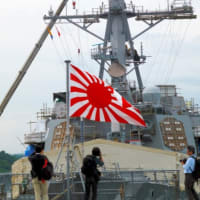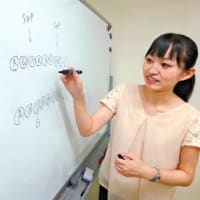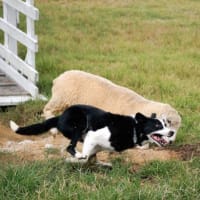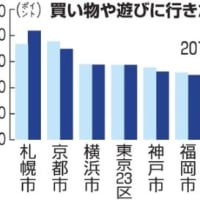世界の主要紙が安倍晋三首相の歴史認識に疑問を呈する状態を見かねたのか、産経新聞の古森義久記者がアメリカの朝日新聞である、敵地The New York Timesに乗り込んで、安倍擁護論を9月30日付で展開しています。政治と英語に関心のある方は読んでおくべきです。
ちなみに、この「誰が安倍晋三を恐れるか」という記事、語数は総数739語。4分で読了し、要約できたらTOEIC860点以上の資格はあります。もちろん、TOEFL受験者の皆さんは、この英文レベルのものをご自身で書けるようになってもらいたいものです。詳しい解説はつけませんが、チャレンジしてください。
**********
Who’s Afraid of Shinzo Abe?
By YOSHIHISA KOMORI
Published: September 30, 2006 Washington
LAST Tuesday, Japan’s Parliament elected Shinzo Abe as its youngest prime minister since World War II. Some critics in Japan have called him a “hawkish nationalist,” but in fact, he — like the nearly 80 percent of Japanese also born after the war — has merely been shaped by democracy.
Mr. Abe in particular was also influenced by the course of Japan’s alliance with America. In 1960, the 6-year-old Shinzo Abe sat on the lap of his grandfather, Prime Minister Nobusuke Kishi, while thousands marched outside demonstrating against the first full-fledged security treaty between Japan and the United States. It was Nobusuke Kishi who guided Japan into the treaty, and opposition was fierce. Mr. Abe recalls that his grandfather remained calm while explaining to him that teaming up with America would be the best course for the Japanese people.
Forty-six years later, few Japanese would deny the wisdom of the alliance or the benefits it has brought Japan. The experience also taught Mr. Abe the value of having a long-term vision and the will to see it through.
Mr. Abe, as a junior politician, was catapulted from relative anonymity to national popularity by principled challenges to the status quo. In the early 1990’s he challenged the government by investigating the abduction of Japanese citizens by North Korea and supporting the efforts of their families to bring them home. Later, he was among the first Japanese political leaders to criticize China on issues of democracy and human rights.
In the wake of 9/11, Mr. Abe led the parliamentary effort to authorize cooperation with the United States’ war on terrorism. On all these issues, he initially encountered significant opposition within Japan, but ultimately won strong support from the majority of Japanese.
A significant part of Japan’s baggage over the last 61 years is related to its activities in China during the war. Although Japan accepted all judgments of the Tokyo War Crimes Tribunal and other regional war tribunals, and signed the San Francisco Peace Treaty, China in particular has aggressively pushed viewpoints that inflate and contradict those judgments. For years, Japan’s government stayed quiet to avoid denunciations of “whitewashing.”
Mr. Abe, while openly acknowledging and expressing remorse for Japan’s wartime mistakes and atrocities, was among the first politicians to question government silence on these escalating emotional and uncorroborated claims, and to point out that Japan’s postwar prime ministers have formally apologized to China more than 20 times for Japan’s wartime transgressions. Mr. Abe has said one of the new government’s priorities is improved relations with China, but noted that “it takes two to reconcile.” He looks forward to a China that can accept today’s democratic Japan.
For most of the postwar era, the Japanese sense of national identity was suppressed and condemned inside Japan. The flag and national anthem were kept out of schools and expressing pride in Japan was deemed “dangerous.” No one denies this was a result of the tragic and reckless war into which Japan’s misguided government had plunged the country.
But it went too far. Now, without forgetting the lessons of history, and with popular support, the government is swinging the pendulum from its post-war extreme toward the center.
The “hawkish nationalist” label has been adopted by some members of the Western press who seem uncomfortable leaving behind the 20th century and acknowledging Japan’s solid democracy, and likely derives from Mr. Abe’s willingness to tackle yet another postwar taboo: constitutional reform.
The Abe government’s plan to revise the Constitution is intended to fill gaping holes in national security. The postwar Constitution drafted by the American occupation authority imposed appropriate constraints meant to prevent Japan from rebuilding as a military power, but these constraints now impede legitimate national defense and peacekeeping activities.
Japan’s Self-Defense Forces, sent to Iraq as international peacekeepers, could not engage in combat under the Constitution; they had to be protected by Dutch and Australian forces. Nor could Japan help if America were attacked anywhere except on Japanese territory. North Korea’s recent missile launches over Japan, and China’s military expansion, including violations of Japan’s airspace and territorial waters, have only heightened the national feeling of vulnerability and now drive public support for constitutional revision.
Adhering to his grandfather’s advice, Mr. Abe will keep Japan’s future defense firmly within the framework of its alliance with the United States. Americans, Republicans and Democrats alike, will find the popular new prime minister thoroughly modern and straightforward, and a trustworthy friend.
*********
いかがでしたか。ゴウ先生にはごく普通のことが書かれているという印象です。さすがに、東京裁判は裁判ともいえない戦勝国による報復劇であるとまでは書けないまでも、穏当な表現で安倍内閣の性格をアメリカ国民ならびに世界に向かって伝えているといってよいでしょう。
一方的に言われ放しでは話になりません。日本国民誰もが、主張すべきは主張するような態度をとることが重要なのです。
もちろん、世界に対して持論を展開するためには、高度な英語力が必要です。ゆえに、日本を代表する気概のある若者たちにはぜひ半端でない英語力を身につけてもらいたいと望む次第です。
もちろん、当英語塾INDECは、いつでもそのお手伝いをさせてもらいます。勉強してください。世界の知識人と伍して戦える力を持ってください。
INDECは、夢と希望にあふれた若者を応援しています!
公式サイト: http://indec.jp
ちなみに、この「誰が安倍晋三を恐れるか」という記事、語数は総数739語。4分で読了し、要約できたらTOEIC860点以上の資格はあります。もちろん、TOEFL受験者の皆さんは、この英文レベルのものをご自身で書けるようになってもらいたいものです。詳しい解説はつけませんが、チャレンジしてください。
**********
Who’s Afraid of Shinzo Abe?
By YOSHIHISA KOMORI
Published: September 30, 2006 Washington
LAST Tuesday, Japan’s Parliament elected Shinzo Abe as its youngest prime minister since World War II. Some critics in Japan have called him a “hawkish nationalist,” but in fact, he — like the nearly 80 percent of Japanese also born after the war — has merely been shaped by democracy.
Mr. Abe in particular was also influenced by the course of Japan’s alliance with America. In 1960, the 6-year-old Shinzo Abe sat on the lap of his grandfather, Prime Minister Nobusuke Kishi, while thousands marched outside demonstrating against the first full-fledged security treaty between Japan and the United States. It was Nobusuke Kishi who guided Japan into the treaty, and opposition was fierce. Mr. Abe recalls that his grandfather remained calm while explaining to him that teaming up with America would be the best course for the Japanese people.
Forty-six years later, few Japanese would deny the wisdom of the alliance or the benefits it has brought Japan. The experience also taught Mr. Abe the value of having a long-term vision and the will to see it through.
Mr. Abe, as a junior politician, was catapulted from relative anonymity to national popularity by principled challenges to the status quo. In the early 1990’s he challenged the government by investigating the abduction of Japanese citizens by North Korea and supporting the efforts of their families to bring them home. Later, he was among the first Japanese political leaders to criticize China on issues of democracy and human rights.
In the wake of 9/11, Mr. Abe led the parliamentary effort to authorize cooperation with the United States’ war on terrorism. On all these issues, he initially encountered significant opposition within Japan, but ultimately won strong support from the majority of Japanese.
A significant part of Japan’s baggage over the last 61 years is related to its activities in China during the war. Although Japan accepted all judgments of the Tokyo War Crimes Tribunal and other regional war tribunals, and signed the San Francisco Peace Treaty, China in particular has aggressively pushed viewpoints that inflate and contradict those judgments. For years, Japan’s government stayed quiet to avoid denunciations of “whitewashing.”
Mr. Abe, while openly acknowledging and expressing remorse for Japan’s wartime mistakes and atrocities, was among the first politicians to question government silence on these escalating emotional and uncorroborated claims, and to point out that Japan’s postwar prime ministers have formally apologized to China more than 20 times for Japan’s wartime transgressions. Mr. Abe has said one of the new government’s priorities is improved relations with China, but noted that “it takes two to reconcile.” He looks forward to a China that can accept today’s democratic Japan.
For most of the postwar era, the Japanese sense of national identity was suppressed and condemned inside Japan. The flag and national anthem were kept out of schools and expressing pride in Japan was deemed “dangerous.” No one denies this was a result of the tragic and reckless war into which Japan’s misguided government had plunged the country.
But it went too far. Now, without forgetting the lessons of history, and with popular support, the government is swinging the pendulum from its post-war extreme toward the center.
The “hawkish nationalist” label has been adopted by some members of the Western press who seem uncomfortable leaving behind the 20th century and acknowledging Japan’s solid democracy, and likely derives from Mr. Abe’s willingness to tackle yet another postwar taboo: constitutional reform.
The Abe government’s plan to revise the Constitution is intended to fill gaping holes in national security. The postwar Constitution drafted by the American occupation authority imposed appropriate constraints meant to prevent Japan from rebuilding as a military power, but these constraints now impede legitimate national defense and peacekeeping activities.
Japan’s Self-Defense Forces, sent to Iraq as international peacekeepers, could not engage in combat under the Constitution; they had to be protected by Dutch and Australian forces. Nor could Japan help if America were attacked anywhere except on Japanese territory. North Korea’s recent missile launches over Japan, and China’s military expansion, including violations of Japan’s airspace and territorial waters, have only heightened the national feeling of vulnerability and now drive public support for constitutional revision.
Adhering to his grandfather’s advice, Mr. Abe will keep Japan’s future defense firmly within the framework of its alliance with the United States. Americans, Republicans and Democrats alike, will find the popular new prime minister thoroughly modern and straightforward, and a trustworthy friend.
*********
いかがでしたか。ゴウ先生にはごく普通のことが書かれているという印象です。さすがに、東京裁判は裁判ともいえない戦勝国による報復劇であるとまでは書けないまでも、穏当な表現で安倍内閣の性格をアメリカ国民ならびに世界に向かって伝えているといってよいでしょう。
一方的に言われ放しでは話になりません。日本国民誰もが、主張すべきは主張するような態度をとることが重要なのです。
もちろん、世界に対して持論を展開するためには、高度な英語力が必要です。ゆえに、日本を代表する気概のある若者たちにはぜひ半端でない英語力を身につけてもらいたいと望む次第です。
もちろん、当英語塾INDECは、いつでもそのお手伝いをさせてもらいます。勉強してください。世界の知識人と伍して戦える力を持ってください。
INDECは、夢と希望にあふれた若者を応援しています!
公式サイト: http://indec.jp











